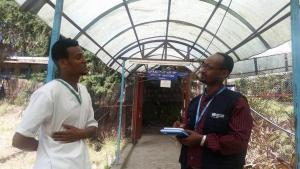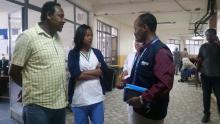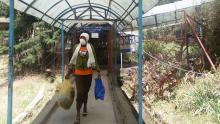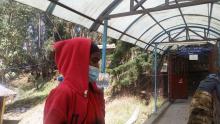Ethiopia’s effort in fighting against Tuberculosis (TB) is progressing: TB still predominates in the younger population
Ethiopia commemorated World TB Day on 24th March 2019 in Afar region Samara town. The theme of World TB Day for 2019 is ‘It is time to end TB’ that puts the accent on the urgency to act on the commitments made by global leaders to scale up access to prevention and treatment; to build accountability; to ensure sufficient and sustainable financing including for research; to promote an end to stigma and discrimination, and promote an equitable, rights-based and people-centered TB response. TB is one of the top 10 causes of death worldwide and the leading cause from a single infectious agent (above HIV/AIDS). Millions of people continue to fall sick with TB each year. In 2017, TB caused an estimated 1.3 million deaths among HIV-negative people and there were an additional 300 000 deaths from TB.
The government of Ethiopia in collaboration with development partners, bilateral and multilateral organizations, and community at large is jointly working to combat this deadly disease and achieve the set sustainable development goals (SDGs) by 2030 and END TB by 2035. The country is implementing the globally recommended TB control strategies and the services are provided in public and quite countable numbers of private health facilities nationwide. Since the implementation of the strategies, more than a million TB cases have been identified and treated successfully and many more lives were saved.
Ending the TB epidemic by 2035 requires concerted efforts of the government, developmental partners, academicians, civic society organizations, patient advocates, private sector and the community at large. There is huge effort by WHO in the global arena for countries to increase political commitment and investment to attain this goal.
The annual World TB day in Ethiopia is commemorated every year with different activities including research conferences , the World TB day (WTD) commemorations, and the national TB Program (NTP) biannual review meetings consecutively. Increased number of TB researches has been undertaken in the country since the establishment of TB Research Advisory committee (TRAC) in 2001.
Accordingly this year the 14th TRAC conference and WTD commemoration have been held from March 21 – 23 and 24th March consecutively in Semera, Afar regional state. These events are co-hosted by the Afar RHB and the Semera University.
Speaking during the World TB Day Commemoration, Dr Chatora Rufaro, WHO Representative to Ethiopia said that “WHO reiterates its usual commitment to support the Ministry of Health (MoH) and provide technical support to identify, and implement the national TB and HIV research priorities and generation of evidence for informed decision making.”
There has been a major decline on the incidence and TB associated death rates in the country. The TB incidence rate (TB+HIV) has dropped from 369 in 1990 to 164/100,000 population in 2017. The TB related mortality rate (TB+HIV) has also declined from 89/100,000 in 1990 to 24/100,000 in 2017. However, Ethiopia is among 30 high TB, TB/HIV and DR-TB Burden Countries. TB still predominates in the younger population. 70% of notified cases are within the age group of 15-54 years. People living with HIV are more likely than others to become sick with TB and worldwide it is also one of the leading causes of death among people living with HIV.
To overcome the challenges, the Ministry and Regional Health Bureaus in collaboration with Partners have identified and began implementing highly effective and high-impact initiatives. The initiatives are developed in line with the country’s 2nd HSTP and the End TB Strategy. The key initiatives that are identified and being implemented include to inform, educate and mobilize the communities to maximize their involvement in the fight against TB, the expansion of community TB care and prevention through intensified health extension program and health development army strategies, quality assured TB diagnostics expansion and enhancement, health facility-based TB care and prevention packages, integrated TB/HIV services expansion, TB operational research and innovations and strengthening TB monitoring and evaluation system.
For Further information / interview contact:
Dr Esther Aceng, Communicable Disease Cluster Coordinator, Email: acenge [at] who.int (acenge[at]who[dot]int)
Dr Ismael Hassen, National professional Officer for Tuberculosis, Email: endrisi [at] who.int (endrisi[at]who[dot]int)
Dr Eshetu Kebede, TB Program Officer, Email: kebedee [at] who.int (kebedee[at]who[dot]int)






